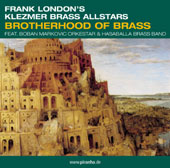 Search the KlezmerShack: Search the KlezmerShack:
Loading
Note that the latest stuff may not yet be indexed.
For further info:
about Frank London's Brotherhood of Brass
About Frank London
Also by Elliott Simon on the Klezmershack: Klezmer Madness at the Tonic.
Elliott Simon's review of Brotherhood of Brass, Live
other klezmer articles on the Internet
|
[Note: This article was posted to the jewish-music mailing list by Elliot Simon on 10 Aug 2002. It
is html-ized and made available here by permission. ari]
Frank London's "Brotherhood of Brass"
reviewed by Elliott Simon Brotherhood of Brass Brotherhood of Brass
Frank London's Klezmer Brass All Stars
Piranha CD-PIR1683, 2002
The mystical high priest of New Wave Avant-Klez jazz, Frank London, has
released an album that defies phony political barriers and exposes
solid musical commonalties among Gypsy, Jewish and Arabic
music. "Brotherhood of Brass", the second release from Frank London's
Klezmer Brass All Stars, is a concept album that reaches across
multiple millennia to present a view of musical cultural inter-
relationships. For this purpose, London has enlisted the aid of two
other brass bands, the Boban Markovic Orkestar (Serbia) and the
Hasaballa Brass Band (Egypt). With the Klezmer Brass All Stars own
impressive line up, the resultant melding of Jewish, Romanie and
Moorish sounds exposes common threads that at times effect an exciting
musical A-HA phenomenon.
The first cut, "Freylekhs-Cocek #5", is from the repertoire of German
Goldenshtayn, one of the few remaining "old-world trained" Klezmer
clarinetists. A Jewish freilach with a Gypsy cocek, it features Boban
Markovic. Markovic is the pre-eminent Roma trumpet player in the world
and "blows them away" each year at the Guca, Serbian Brass festival.
Clarinet and trumpets trade off and build to a fever pitch as we are
taken back to a time when perhaps the boundaries between Jewish and
Gypsy music were porous.
On one level, these and the four other
Markovic/London collaborations are making a politico-historical
statement but on another level, when you hear them, you forget about
politics and history and just dance. For that is what this music really
is; happy celebratory dance music. From Serbia to Cairo to New York
City's Lower East Side, people who hear this will be dancing. Of these
five, "Lieberman Funky Freylekhs" and "Doin' the Oriental" are
standouts. For the former, a funky freilach beat is pumped out by Mark
Rubin on the bass helicon, whose playing is exceptional throughout the
entire CD. "Doin' the Oriental" could be called the signature piece of
the album. It is "from the trans-national repetoire" and is in two
parts. Part 1 sets up with a trumpet doina as in Doina the Oriental and
Part 2 does the oriental with a melding of Gypsy/Jewish jazz that is
very sweet.
A drawback is the lack of credits as to who played which horn on what
cut. You sit and think; "Wow that solo was hot, was that Frank or
Boban?" but then again, maybe that is the point. A-HA. This is a CD
chocked full of music, 16 songs with a surprise 17th that is
uncredited, for over 65 minutes of listening, make that dancing. The
straight-ahead Klezmer like "Wedding in Crown Heights", "Watts-Hoffman
Special", "Fast Hasidic Nign" and "A Freylekhs Nokh Dem Khuppah"
evidence that the Brass All Stars continue to be the premier big brass
Klez band. These selections pay homage to Klezmer legends like Harry
Kandel and xylophonist Jack Hoffman, whose granddaughter Susan Watts Hoffman
plays a solid second trumpet with the All-Stars. The band is a who's
who of Klez-jazz and feature current or former members of the
Klezmatics, Klezmer Conservatory Band and Hasidic New Wave.
As "Nomen Est Omen (The name is a sign)" alludes, Gypsy is
etymologically related to Egypt and Abd Ehamid Kamel on metal clarinet
takes the stage with his Hasaballa Brass Band on "Imayel Ya Khail"
and "Shish Kebab". The blending of a very Arabic/Moorish sounding
clarinet and percussion with a Klez/jazz rhythm makes you stop and take
notice. Kamel is clearly a very accomplished musician who plays
the "Hasaballa" style. This style of Egyptian music is named for
Hasaballa, who fronted a brass band of retired army musicians. They
would play for weddings, pilgrimages to Mecca, the transfer of a brides
clothing to her new home and any other occasion that called for a large
amount of noise. They were playing mid eastern quartertone songs on
army brass instruments and were looked down upon by other Egyptian
musicians. A-HA.
This is a fun CD that makes you both think and dance.
You can't really ask for more.
Elliott Simon
elliott_simon@dca.net
|
 Brotherhood of Brass
Brotherhood of Brass
